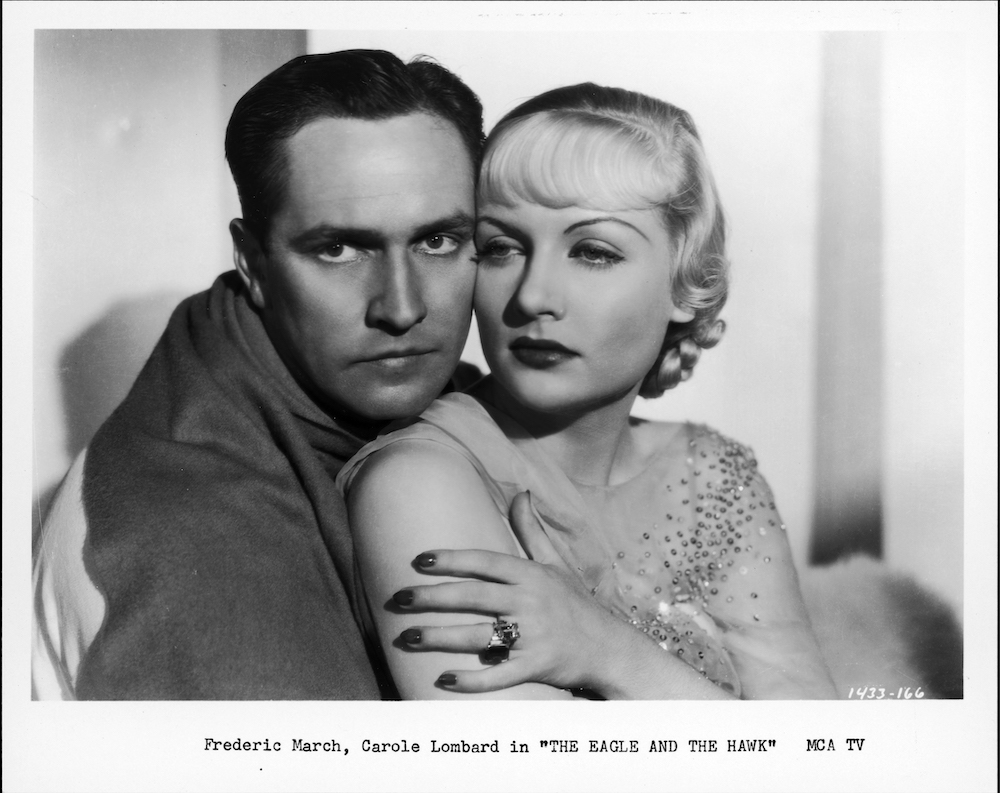October 6 is the birthday of Carole Lombard, who would have been 112 this year. Of course that’s an age she was unlikely to have reached, yet somehow it doesn’t seem much less improbable than what actually happened: Dead at just 33, in a 1942 airplane crash returning home from the Midwest after selling over $2 million in war bonds. (So soon after Pearl Harbor, lights that normally warded aircraft away from mountains near Las Vegas were kept dark against potential invading Axis forces.)
There was no more beloved celebrity couple at the time than Lombard and Clark Gable, whom she left a widower—not his first (or last) marriage, but evidently a very happy one. Certainly the public could not imagine a better consort for “The King” of Hollywood than this star peer who looked like a goddess but apparently swore like a sailor, and had the good-humored sass to knock any royalty off its pedestal.
Lombard was never in his league as a box-office attraction, but she, too, was loved onscreen: No one so thoroughly personified the commingled glamour and wackiness of the screwball comedy genre, which had seemingly arrived specially to make the Great Depression a bit more bearable. There were others equally at home in those simultaneously cynical, frivolous, and snappy films. But their arrival transformed Lombard—where she’d been glossy, competent, but quite interchangeable with numerous other early 1930s leading ladies, suddenly comedic inspiration made her seem unique, even more beautiful.
The story goes that she was cast in her first screwball, 1934’s Twentieth Century, when director Howard Hawks saw her inebriated at a Hollywood party, demonstrating a level of antic spontaneity none of her movies to date had remotely suggested. Once convinced to channel that same energy onscreen, she earned new adoration from critics and audiences in large part because she was not only a skillful farceur, but really seemed to be having fun. When she died, the world briefly felt all life had gone out of that Hollywood party, in a larger sense.
Carole Lombard will be remembered for that golden string of near-perfect comedies, which also included Nothing Sacred, True Confession, Hands Across the Table, The Princess Comes Across, her Lubitsch-directed swansong To Be Or Not To Be, and above all 1936’s My Man Godfrey, in which she took the period screen archetype of “dizzy heiress” to unsurpassed levels of carbonation. None of those are in Kino Lorber’s new Carole Lombard Collection, a Blu-ray box trilogy that is mostly interesting in limning how close its star came to being just another pre-Code cutie—one of many early ’30s marquee names that are now largely forgotten, like Nancy Carroll or Bebe Daniels.

Six-year-old Lombard (nee Jane Alice Peters) moved with her brothers and newly separated mother from Indiana to Los Angeles in 1914. In her teens she began seeking film work, not out of necessity (the family was fairly well-off), but because she enjoyed it. She gradually rose from bit parts to large ones, and benefitted from the need for “new faces” that sound cinema’s arrival brought. In the Kino set’s first film, 1930’s Fast and Loose, she’s a second lead—the virtuous chorus girl dating a dissolute playboy (Henry Wadsworth) while the latter’s equally “wild” sister (Miriam Hopkins) has her own working-class flame (Charles Starrett, later a staple in “B” westerns). It was mostly a debut screen vehicle for Hopkins, an actress whose artifice has not aged well,. You’d never guess from this stodgy, stagey early talkie that director Fred C. Newmeyer had made several of Harold Lloyd’s greatest silent comedies.
Somewhat better is the next year’s Man of the World, in which William Powell plays a jaded American in Paris posing as a respectable journalist to practice blackmail scams on wealthy tourists like Lombard and uncle Guy Kibbee. Nonetheless, he falls in love with her for real and vows to reform, only to be blackmailed by his own jealous associate (Wynne Gibson). A bleakly anti-romantic ending is the only real distinction here, apart from Powell’s superb underplaying—though offscreen it was different, as Lombard married her co-star that same year. It didn’t last, but they remained friends: Thank god, since My Man Godfrey still lay ahead for them both.

The nominal best of the trio is No Man of Her Own, a 1932 joint that also demonstrated how much more fluid sound filmmaking had become in a short time. It was the only movie Lombard made with Gable, though reportedly at the time no sparks flew; it wasn’t until they met again a few years later that they clicked, marrying in 1939. It’s basically the same plot as Man of the World, this time with Gable as a card sharpie who marries small-town good girl Connie, keeping his unclean source of income hidden from her—or so he thinks. Gable was a fast-rising star whose swagger easily dominates here; Lombard shows some signs of personality, but is still basically just The Girl.
Styled like every other celluloid beauty of the period, she’s not a bad actress, but the formulaic material doesn’t draw anything out of her beyond competence. Even in an excellent movie like the next year’s The Eagle and the Hawk (also recently released by Kino Lorber), a cracking tale of disillusionment amongst WW1 fliers Fredric March and Cary Grant, she’s just a lovely vision of superfluity—given one wholly gratuitous, unconvincing scene to give this otherwise all-male drama some “sex appeal.”
No wonder everyone was amazed (including, apparently, the lady herself) when Twentieth Century and later vehicles revealed the live wire that had laid neglected beneath these dull roles. The Carole Lombard Collection offers an interesting glimpse of polished if routine “Dream Factory” product in the early 1930s, but it’s mostly fascinating for how little evidence it provides of what this star would soon become.
Billy the Kid
In the streaming world, new arrivals encompass a lot of odds and ends. Roxie Virtual Cinema is showing Jennifer Venditti’s 2007 documentary Billy the Kid, a verite sketch of a 105-lb. Maine 10th grader and supposed karate purple-belt who’s at “the awkward stage,” and how. If you think your adolescence was painful, you may feel better about it after watching this sympathetic but supremely squirm-inducing portrait. More info here.
Save Yourselves!
Meanwhile, adulthood has failed the protagonists of this indie comedy, who somehow feel they lack “authenticity.” So the very Brooklyn thirtysomething couple of Su (Sunita Mani) and Jack (John Reynolds) unplug from all their devices and sojourn off to a loaned cabin upstate, to commune with nature and each other.
Unfortunately, this idyll coincides with the civilized world being invaded by space aliens (apparently inspired by “The Trouble With Tribbles”), something our protagonists don’t become aware of for a while because they’ve unplugged. Once they grok the situation, they realize that when it comes to survival, they “don’t have any skills.” This shaggy debut feature by Alex Huston Fischer and Eleanor Wilson has that feeling of improv comedians riffing—an amiable thing, but one that gets pretty thin over 93 minutes’ course. It’s available on digital platforms as of today.
To Your Last Death
Ditto Jason Axinn’s animated feature looks rather like the Adult Swim series Archer, aiming for a balance between that type of genre satire, violent “adult” comics, and sadistic Saw-type horror. A vicious tycoon (voiced by Ray Wise) gathers his four estranged children for a meetup that turns out to be more like a massacre, further complicated by the meddling of some phantom figures who view all this mayhem as a “game.”
With campy narration from William Shatner, no less, this bloody ‘toon clearly doesn’t take itself too seriously. But it’s also overlong, with too little wit or point to sustain the attention of anyone except diehard gamer fanboy types. Already available on various digital and cable platforms, it’s released on Blu-ray today.
The Campaign of Miner Bo
For a refreshing dose of real-world sincerity, there’s this documentary about the 2018 US Senatorial run of a native West Virginian who gained modest fame for challenging then-Presidential candidate Hillary Clinton’s statement “We’re gonna put a lot of coal miners and coal companies out of business” face-to-face. Bo Copley is evidently a good husband, father and Christian, a real alternative to “career politicians.”
But as Todd Drezner’s documentary charts his David-vs.-Goliaths run against some real swamp-dwellers, you can’t help but notice that good intentions aren’t enough. Does Copley even have a platform? When striking teachers ask what his stance is on their issues (major ones for the state), he doesn’t appear to have even thought about it. Yes, he lacks advertising money and mainstream GOP support, but he also doesn’t seem to have done his basic homework. (He didn’t even know until later that Clinton’s storm-igniting statement was just the first half of a sentence in which she emphasized the need to find new economic foundations for communities rooted in the dying coal industry.)
Bo is unpretentious, gracious, genuine, all the things few politicians are these days. But really, niceness alone is a poor substitute for practical knowledge about policies and government. The US political landscape does need alternative voices—just not unprepared amateurs. Campaign is available on Demand as of today.
Genre Films: Bulk Quantity Aisle
Two new packages of films on the “genre” side (that term now seems to typically refer to anything in the horror, sci-fi, fantasy or thriller realm) offer a lot of bang—or at least bulk—for your buck. Amazon Prime Video’s “Welcome to the Blumhouse” brings together eight new features that become available in pairs, with the first two available as of today, another duo next Tues/13, and others TBA. Blumhouse Productions has had its hand in producing a whole lot of popular horrors over the last decade, including some real winners (Get Out, Happy Death Day, The Invisible Man) and several decent franchises (The Purge, Insidious, Paranormal Activity). So at the very least, one might expect this set of “spine-tingling thrillers” to offer formulaic fun, with maybe a sleeper surprise or two.
Alas, the first four features available for preview suggest “Welcome” is instead a sort of group home for otherwise orphaned films nobody wanted, low on genre thrills and entertainment value in general. The only notable exception is The Lie, a two-year-old Canadian drama from writer-director Veena Sud that’s a remake of the 2015 German We Monsters. Peter Sarsgaard and Mireille Enos play acrimoniously divorced parents of a teenager (Joey King) who’s not just a brat, but an apparent murderess as well—something they go to excruciating lengths to cover up. It’s a twisty if not always plausible tale closer to something like We Need to Talk About Kevin than genre terrain. At least it’s interesting, which is more than you can say about the uninspired-to-tedious other previewed films on this Welcome wagon.
Probably a better bet for those thus inclined is Nightstream, an online event running Oct. 8-11 (with some films available through the 14th) that’s a pooled effort between five US genre festivals whose normal annual festivities have been temporarily curtailed by COVID. The world premiere features include thriller Run, with American Horror Story’s Sarah Paulson; Japanese genre favorite Ryuhei Kitamura’s new action film The Doorman, with Ruby Rose and Jean Reno; bloody puppet epic Frank & Zed; and comedy horror It Cuts Deep.
There are films from France (including the official closer, Quentin Dupieux’s latest quirky comedy Mandibles), Australia, Ireland, Sweden, Canada, Italy, Taiwan, Chile, Indonesia, Japan and Argentina. Virtual panels/podcasts encompass a 20th anniversary celebration of Mary Harron’s American Psycho, a sit-down with director Nia DaCosta (Little Woods, the upcoming Candyman remake), a salute to “Horror Camp!” hosted by SF’s own Peaches Christ, and tribute to horror producer/director/superfan Mick Garris. There will also be numerous interactive elements. Among features we caught in advance, don’t miss the U.S. Dinner in America, a particularly savory suburban punk-rock black comedy, or Lapsis, a strikingly original and humorous sci-fi parable about the “gig economy.” For full program and ticket info, go to www.nightstream.org.



